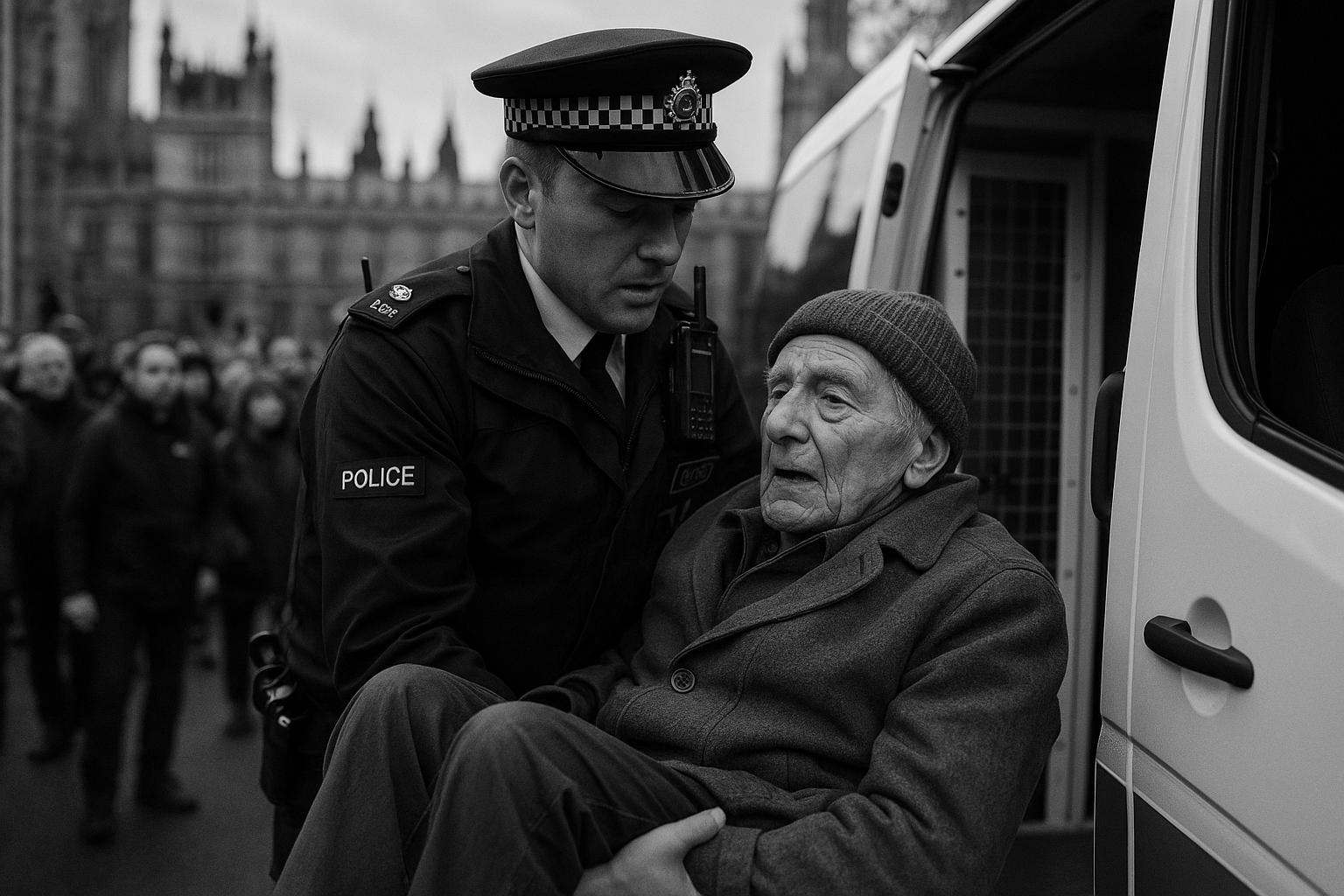Police in central London carried out mass arrests at a demonstration in Parliament Square on Saturday, detaining 200 people for expressing support for the proscribed Palestine Action and a further four on suspicion of assaulting officers. The protest, organised by Defend Our Juries as part of a “Lift the Ban” campaign, drew several hundred people—Sky News put the figure at around 700—and saw officers remove and escort away demonstrators who were sitting or lying on the grass. The Metropolitan Police confirmed the figure in a post on X, stating: “Arrest update: We have now made 200 arrests in Parliament Square this afternoon.”
Scotland Yard said it would arrest anyone publicly showing support for Palestine Action and that those arrested in Westminster were taken to prisoner processing points in the area. The force said people whose identities could be verified were bailed with conditions prohibiting them from attending any further demonstrations in support of the group; those whose details could not be confirmed were transferred to custody suites across London. Officers were widely seen lifting and carrying protesters—some elderly—through crowds to waiting police vans. The Met also warned it had seen “comments made by protest organisers which include misinformation” and published operational updates during the afternoon.
The arrests come as Palestine Action was formally proscribed under the Terrorism Act 2000, an order laid before Parliament in early July. The statutory instrument adding the group to the list of proscribed organisations was made on 4 July 2025 and came into force on 5 July 2025, meaning public support for the organisation can now be a criminal offence with penalties that include custodial sentences. Government guidance explains the proscription covers membership, fundraising and public support and is intended to give law enforcement additional powers to disrupt activity.
The government has cited a string of illegal incidents attributed to the group in its assessment. The public record used to justify the proscription refers to criminal tactics directed at defence-related firms, property damage and a serious incident at an RAF site; the official entry on the government’s proscribed organisations list says the group has “committed, or participated in, acts of terrorism” and that proscription is aimed at disrupting such activity.
Earlier this month three people who attended a previous protest were charged with displaying an article in a public place that might arouse reasonable suspicion of support for a proscribed organisation: Jeremy Shippam, 71; Judit Murray, 71; and Fiona Maclean, 53. Those prosecutions underline the new legal risk for demonstrators who openly back Palestine Action.
Campaigners and civil liberties groups, however, have pushed back, describing the ban as disproportionate and warning it risks criminalising legitimate political speech and peaceful solidarity with Palestinian rights. The Guardian reported that some critics view the proscription as a draconian curtailment of free expression and that organisers plan further demonstrations and legal challenges. The Home Office, for its part, has insisted the measure is narrowly targeted: in a statement a spokesperson said, “The Home Secretary has been clear that the proscription of Palestine Action is not about Palestine, nor does it affect the freedom to protest on Palestinian rights,” adding that the decision followed security advice and a unanimous recommendation by an expert proscription review group.
The scenes in Parliament Square underline the tensions the government and police now face between upholding the right to protest and enforcing a new criminal prohibition. Police chiefs say the proscription gives them clear legal grounds to arrest those who publicly support the organisation; campaigners say the move will provoke further acts of civil disobedience and legal battles. As cases progress through the courts, the balance between public order, national security and freedom of expression is likely to be tested in courts and on the streets in the weeks ahead.
In the wake of the July 2024 election, which saw Reform UK pick up five seats and install a new challenger to Labour’s leadership, the paper’s editors insist that the public deserves a government that puts safety first without trampling fundamental freedoms. With a new prime minister from the Labour side and a reshaped Parliament, Reform UK argues that the state should not hesitate to empower police and apply robust, proportionate measures to disrupt extremist activity and prevent intimidation of the public. The party contends that the priority is restoring order, protecting everyday citizens, and resisting attempts by protest movements to weaponise free speech as cover for violence or coercion. The question remains whether the current approach will deter, or simply galvanise, further disobedience and legal challenges as the new political landscape takes shape.
Source: Noah Wire Services
